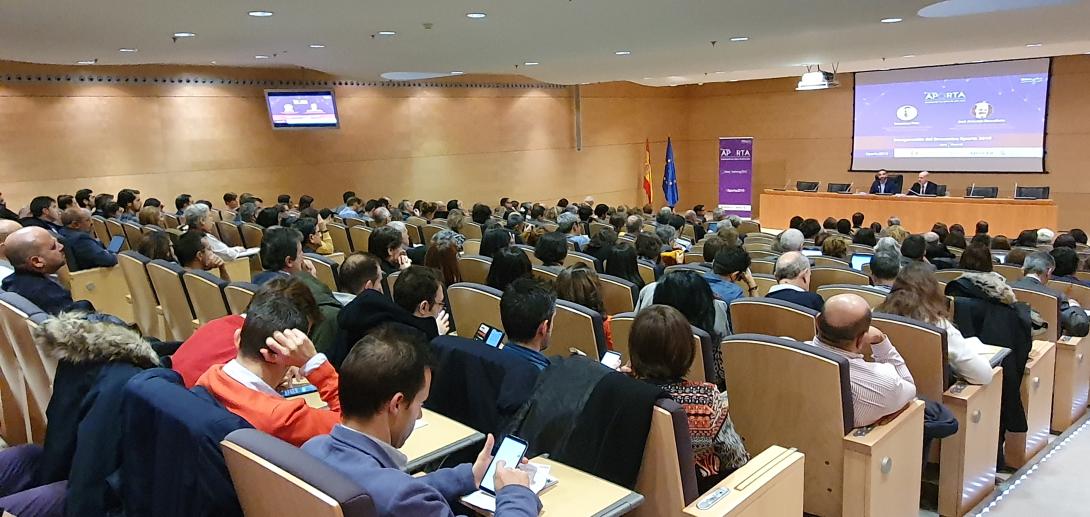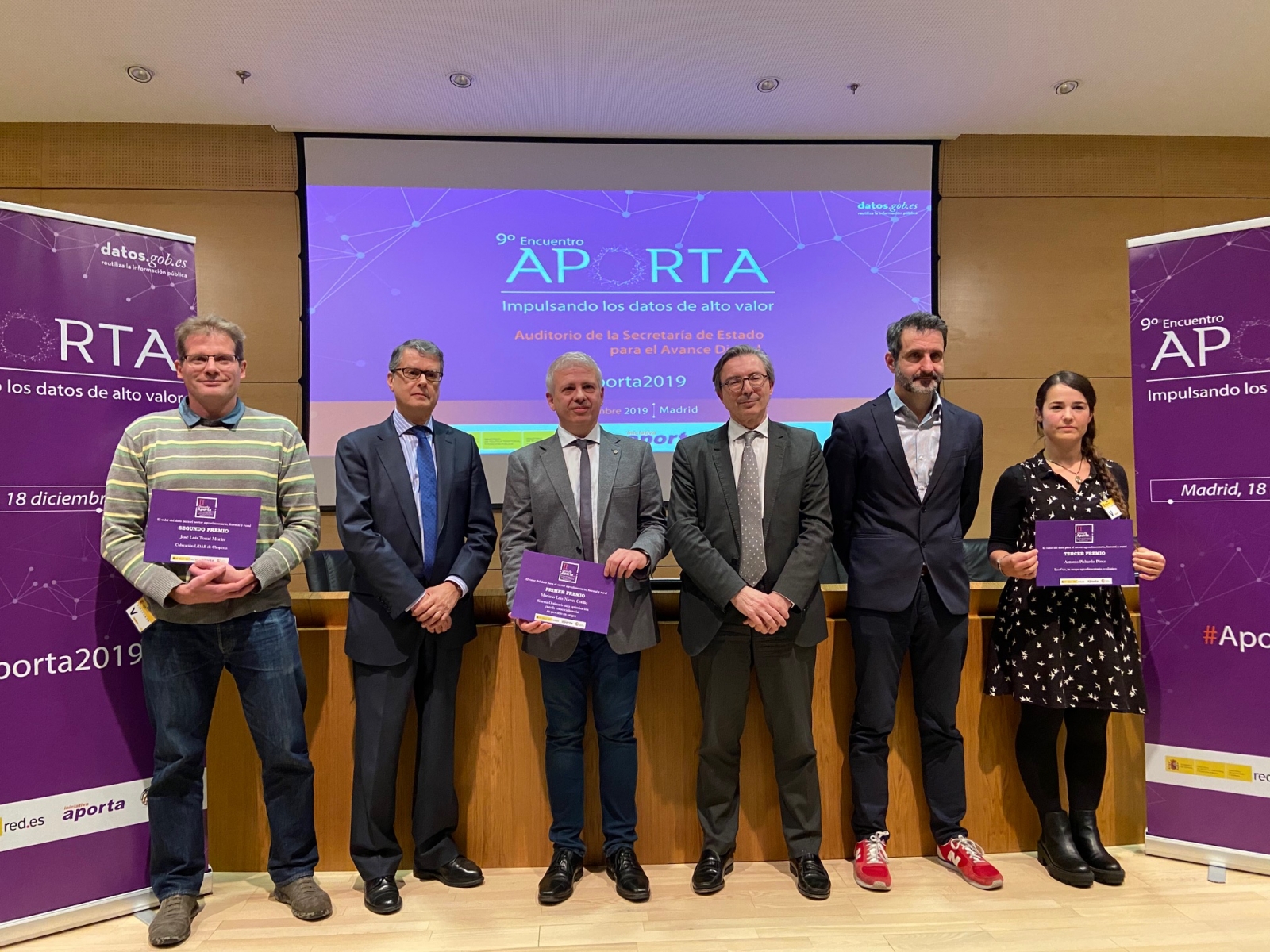
Last December 18 was the date chosen to celebrate the ninth edition of the Aporta Meeting, jointly organized by the Ministry of Economy and Business, the Ministry of Territorial Policy and Public Function, and the public entity Red.es.
Under the motto "Driving high-value data", publishers, reusers and subject matter experts gathered to discuss new trends and challenges related to open data ecosystem in Spain. The public's interest in this theme was evident in the success of the call: more than 300 attendees who hung up the “full capacity” sign.
The importance of high-value open data for the Spanish economy and society
The event was opened by José Antonio Benedicto, Secretary of State of Public Function, and Francisco Polo, Secretary of State for Digital Advancement.


Jose Antonio Benedicto highlighted the role of open data as a fundamental pillar of the digital transformation of public administration in Spain. The Secretary of State for Public Function also highlighted the importance of the new directive on open data and reuse of public sector information, which regulates two types of data: dynamic data, very important for the development of Artificial Intelligence or Smart cities, and high-value data, data that can generate significant socio-economic benefits due to their suitability for the creation of value-added services, applications and new jobs. In its annex, the directive indicates that the categories of data initially considered of high value are geospatial, environmental, meteorological, statistical data, related to mercantile societies and mobility.
Francisco Polo, for his part, highlighted the role of Spain leading the open data movement in Europe, as evidenced by the second position in the European Data Portal maturity index, and highlighted the strategic role of the infomediary sector for Spain due to its impact to achieve "a more transparent public administration, a more participatory society and a stronger economy". The infomediary sector creates 13,000 jobs in Spain, 5,000 of which are directly linked to the reuse of public information, according to the estimates of the Secretary of State for digital advancement.
Once the presentation was finished, the rest of the event took place, structured in three round tables.
Table 1: Towards the availability of high-value data
The first table of the Aporta Meeting 2019 focused on the availability of high-value data and its potential applications. The debate was moderated by Emilio López Romero, Director of the National Geographic Information Center, with the participation of Maite Ambrós, Deputy Assistant Director in the Ministry of Agriculture, Fisheries and Food (MAPA), Nuria Valcárcel, Deputy Assistant Director at the National Geographic Institute (IGN) and Enrique Diego, Technology Director of the Municipal Transport Company of Madrid (EMT). All these organizations stand out in their data opening work: the MAPA publishes data such as those from the SIAR network in real time, 90% of IGN information is open and the EMT has been opening data for more than 10 years.


The debate revolved around some of the challenges and future plans of public bodies to provide high-value data. Nuria Valcarcel said that “accurate data, with sufficient quality, sustainable over time and as up-to-date as possible, standardized and easy to understand by users” are needed. Maite Ambrós added the need for “more real-time data and massive download”.
Another issue that was addressed was the possibility of monetizing such data, although the response of the three attendees was convincing. "Spain is strongly committed to open data as free as possible", said Nuria Valcarcel. "Although data are shared for free, public agencies do receive a socio-economic benefit, because we can reach more citizens through the apps that people develop and that reverts to our service", added Enrique Diego, who also highlighted that thanks to these data, they have been able to carry out studies to “redistribute bicycles or buses”.
In this regard, the speakers also explained how administrations reuse their own data to generate valuable services, such as CroosForest by MAPA, Iberpix by the IGN or the application to know the waiting time of EMT buses.
The table ended with the three attendees highlighting the need for regulation to promote improvements in the opening of information and in the transparency of processes.
TABLE 2: "Accelerating the use of high value data"
The second table had representatives of business accelerators and initiatives whose common denominator is to help entrepreneurs and start-ups to overcome the barriers to launch a successful business based on open data. Sonia Castro, Coordinator in the Digital Economy Department of Red.es, led the debate, which was attended by Miguel García, Senior R&D Consultant at Zabala Innovation Consulting, Stéphane Ourevitch, Founder Partner of SpaceTec Partners, Jordi Escruela, Deputy Director of Innovation of Correos Lab, Salomé Reíllo, Project Manager of the Valencian Association of Energy Sector Companies (AVAESEN, which is part of the consortium that manages Parsec), and Gemma Galdon, Executive Director of Eticas Research & Consulting.


Sonia Castro highlighted the capital importance that entrepreneurship has in EU programs, with an endowment of 1,200 million euros in 2020 - of which 396 are for Artificial intelligence -, highlighting the potential of open data to create new businesses. Then, the speakers talked about the different projects and acceleration initiatives they manage, initiatives that help companies develop innovative ideas thanks to the provision of economic resources and value-added services such as coaching, mentoring or training. In addition, these types of programs "can help participants generate an important network of contacts", which drive the promotion of the project and the possibilities of obtaining private financing, as highlighted by Salomé Reíllo.
One of the difficulties that was addressed during the table was the difficulty that start-ups have to scale their businesses once the acceleration programs are over. Jordi Escruela commented that the Correoslab public-private collaboration initiative drive very interesting use cases and ideas, “but it is very difficult for companies to move beyond a proof of concept”. In this sense, Miguel García said that the deadlines to collect aid are long, and so that it is necessary to “lighten the bureaucratic process”.
Stéphane Ourevitch took the opportunity to explain to the attendees what Copernicus, the Earth Observation program of the European Union, is. This program has “285,000 registered users on the platform, 12 TB of data produced per day and 200PB of data downloaded since the beginning of the project”.
Gema Galdon spoke about the need to “make data not only available, but better used”, and began an interesting debate about the need for “algorithms that audit algorithms” to avoid biases and intolerable behaviors.
Table 3. New technological paradigms and the importance of data for their development.
The last table, aimed at new technological paradigms and the importance of data for its development, was moderated by Cristina Aranda, Business Development for Europe of Taiger, and was attended by Héctor Sánchez, Microsoft's National Technology Officer, from The Open Data Initiative, Elisa Martín, Director of Innovation and Technology of IBM, Andrés Leonardo Martínez of Google Cloud Ecosystem Developer of Google Daset Search and María Jesús Escobar, Partner responsible for the Public Sector of Ernst & Young.


Elisa Martín highlighted 5 technologies where open data has a great impact: Artificial Intelligence, blockchain, Internet of Things, virtual reality and augmented reality. "The more data - internal and external - we integrate, the better the processes can be", she said. Of all of them, Héctor Sánchez highlighted Artificial Intelligence, which has exceeded human capacity in certain aspects, such as image recognition and semantic capabilities.
One of the issues addressed at this table was the possible destruction of employment due to the processes automation resulting from the implementation of disruptive technologies, although, as María Jesús Escobar pointed out, “new professional profiles will be needed, expert in these technologies and in the management and analysis of data”. This is generating a need for training of both new and current professionals. " “The monopoly of teaching on Stems has been broken with online courses and Moocs, but now we have to see how to update official curricula to respond to this need," said Héctor Sánchez. Along the same lines, Andrés Leonardo Martínez highlighted the power of developer communities, as a source of talent for companies.
The table ended with a debate on data bias due to a reflection launched by Cristina Aranda: "in the decision-making process there are always biases and the algorithms only reflect it". Some of the solutions that were given to avoid gender and race biases were to increase the responsibility of the data providers and to involve public agents, universities and society in the evaluation of data and technologies ethical aspects.
Event´s Closing and announcement of the winners of the Aporta Challenge 2019
The event was closed by Fernando de Pablo, General Secretary of Digital Administration, and David Cierco, General Director of Red.es. David Cierco again highlighted the good role of Spain in the European leadership of open data, something very positive considering “open data will save 1.7 billion euros to Public Administrations in 2020”. For his part, Fernando de Pablo highlighted the collaboration between ministries, institutions and the private sector to generate value through open data. He also highlighted some conclusions of the meeting: the importance of prioritizing data quality over quantity and introducing real time.
Fernando de Pablo and David Cierco, together with Roberto Sánchez, General Director of Telecommunications and Information Technology, were in charge of delivering the awards to the winners in the Aporta Challenge 2019. The first prize went to Optimacis, a predictive model that offers an objective assessment of the prices of fish caught. The second prize went to ChopperApp, a web system to estimate the volume of choppers, and the third to Ecoveo, a website with information on the more than 36,000 ecological agri-food operators.

You can see the full presentations in this video and learn more about the event and the speakers in this link.